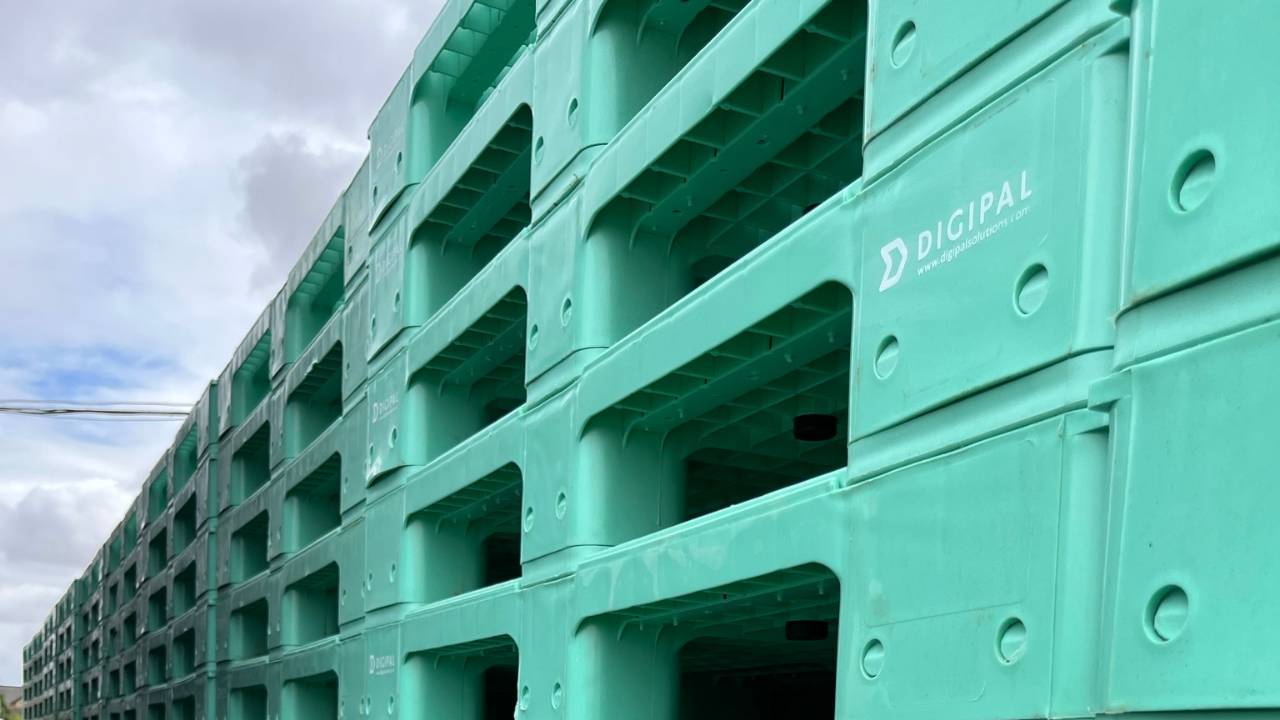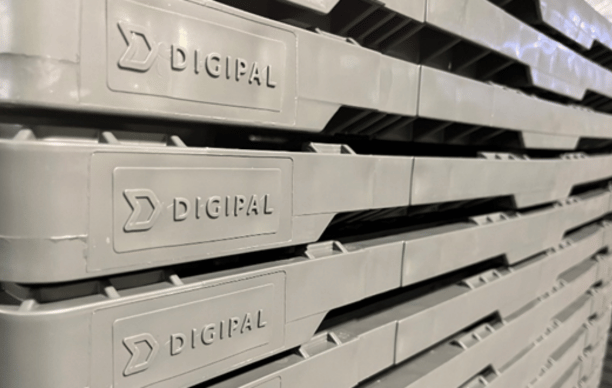It’s no secret how ubiquitous plastics are in the logistics industry, offering convenience, durability, and cost-effectiveness in both packaging and transportation.
However, the widespread use of plastics has raised concerns about its environmental impact and long-term sustainability, causing more of us to ask, “Are the use of plastics in logistics a bad thing?”
Plastics play a significant role in the supply chain, in particular the transportation of goods on plastic pallets provide a sustainable and cost-effective alternative to its ‘wooden’ counterpart. Their lightweight nature, robustness and cleanliness make them the perfect solution for all types of products from food to pharma.

Innovations in Sustainable Packaging
In response to mounting environmental pressures, the logistics sector has witnessed a surge in innovations aimed at embracing the tenets of ‘reduce, reuse and recycle’, especially when it comes to containers and pallets.
Digipals recyclable Plastic Pallets are designed to be reused multiple times and are made from materials that can be recycled at the end of their life. They offer several advantages over traditional wooden pallets, including reduced environmental impact and enhanced sustainability.
Digipals innovative space saving designs can help maximise space in yards and warehouses as well as minimise your carbon footprint by transporting more on less.
As companies seek to minimise their carbon footprint and adopt more eco-friendly practices, recyclable plastic pallets have gained traction as a viable alternative. By embracing such innovations, customers can align their practices with environmental stewardship principles while maintaining fierce competitiveness in the market.

Environmental Impact of Plastic Pallets
According to Statista in September 2022, it was estimated that there are approximately 5 billion pallets in use worldwide. Of that, around 90% are said to be wooden – meaning that there are 4.5 billion wooden pallets in circulation. So, let’s do some maths:
- 1 tree can typically make 8 wooden pallets
- Divide the number of pallets by 8, and we see the how many trees were used to make them
- 4.5 billion ÷ 8 = 562,500,000 trees felled to make these pallets
Since one tree is capable of absorbing, on average 25kg of CO2, 4.5 billion wooden pallets effectively allowed for 14 billion metric tonnes of CO2 to remain in the atmosphere.
But that’s not all!
Within a typical supply chain, up to 25% of wooden pallets will be removed from circulation every year, be that via breakage, damage, or loss – all of which will need to be replaced.
To include that in our numbers:
- 1.125 billion more pallets required
- 140,625 million more trees felled
- 3.515 million metric tonnes of CO2 in the atmosphere
Advantages of Reusable Plastic Pallets
Reusable plastic pallets offer several advantages over traditional wooden pallets. They are highly durable and can withstand repeated use, resulting in fewer pallets being discarded and less waste being generated. Additionally, recyclable plastic pallets have a lower carbon footprint compared to other materials, making them a much more environmentally friendly option for your supply chain.

A Sustainable Path Forward for Logistics
Ultimately, consumer awareness and education are crucial in driving the adoption of recyclable plastic pallets and other eco-friendly practices in logistics. At Digipal, every customer in receipt of our Plastic Pallets knows that its 100% recyclable, made from recycled material and can operate with confidence knowing that at the end of its life it will form part of our circular economy, rather than contributing to landfill waste.
Digipal’s Plastic Pallets are extremely robust with damage rates less than 2% compared to 10-20% for wood.
We offer a number of different options for you to roll out Digipal Plastic Pallets across your supply chain. Through Digipal’s Pallet Pooling and Renting services, whether you’re operating a multinational distribution operation or a small regional network, we enable you to incorporate our pallets in a way that allows you to embrace sustainable practices whilst reducing costs.
In addition Digipal has at its disposal an array of different tracking solutions ranging from RFID all the way to the latest Cellular NB-IoT devices – all of which can integrate with our Plastic Pallets.
We like to stay at the forefront of the latest technologies and as such, we are the key partner and distributor of the battery-free Bluetooth technology developed by Wiliot, which is taking supply chains by storm.
All of these technologies are managed securely through our DigiPortal where data is turned into meaningful insights. These insights are then used to spot leakages and minimise any loss and waste to improve the efficiency and sustainability of your supply chains.
With Digipal, we support businesses looking to implement a more sustainable supply chain by offering solutions tailored to their needs with equipment and technology designed to reduce overall environmental impact.
